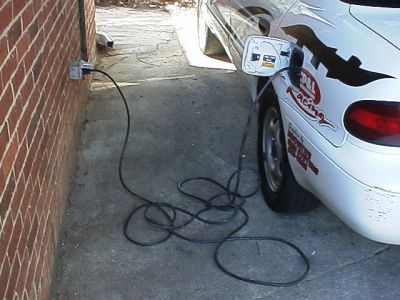2 Views
Quote Of The Day: Extension Cords Bad, Home Inspections Good Edition
by
Edward Niedermeyer
(IC: employee)
Published: October 21st, 2009
Share
Aldo: Hi Mr. Posawatz. I will be buying a Volt and wanted to know if an extension cord could be used to increase the reach for recharging, or if we are going to be limited to the length of the cord that comes with the car. Thanks!
[Chevy Volt Vehicle Line Director] Tony Posawatz: The EVSE or charge cord will be about 25 feet and designed to all relevant codes. We do not recommend extension cords but rather that when you have your home inspection, you reposition your outlet/charging station approproiately [sic].
From a recent Fastlane livechat on the Chevrolet Volt, ironically titled “Making Electric Vehicles Attractive to Consumers.” Which would you prefer?
Edward Niedermeyer
More by Edward Niedermeyer
Published October 21st, 2009 4:36 PM


































Comments
Join the conversation
"What I want to know is how Chevy expects people to charge the car in the rain or snow." The SAE J1772 standard (which they're using, and which pretty much every EV in the US will support) is rated for use in adverse weather conditions (including rain and snow). It has data pins that connect first, and current doesn't start to flow until the cable has confirmed a secure connection. If the connection is ever broken, the current gets immediately shut off.
So lets get this straight. This "city car" needs to be parked in a garage to be plugged in at night. Most urban dwellers "street park" where there is no electrical plug. Suburban dwellers like myself have a garage, but the volt has nowhere near enough range for me to get to work & get back home. The public garage I park in doesn't have available electrical outlets next to the parking spots. Short of Chevy convincing garages to rebuild and run high amp/220 electrical to parking spots, how is this going to work? Also, will my parking fee be raised for any vehicle I drive into the garage? Or just at that spot? I can easily see garages adding an extra $5 to spots that have chargers, and if they do that, then that pretty much defeats the purpose of it being cheaper.
@Robstar Dude, how far do you live from work? The Volt has like a 360 mile range. Say you live 25 miles from work and have no opportunity to charge there. The Volt has a 40 mile all electric range, so only the last 10 miles of your return trip is on gas. Then you plug in at home. You want to plug in when you can because it's a lot cheaper (and more energy efficient) to run on electricity. But the point of it being a hybrid is that you don't have to plug in when you can't.